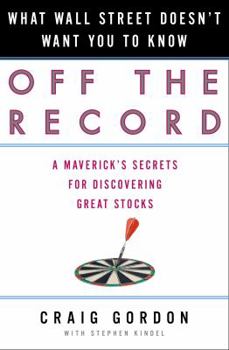Off the Record: What Wall Street Doesn't Want You to Know
A Wall Street maverick shows investors how to find the next Home Depot, Cisco, or Microsoft -- before the Wall Street establishment. When it comes time to making a major purchasing decision -- a car... This description may be from another edition of this product.
Format:Hardcover
Language:English
ISBN:0609607790
ISBN13:9780609607794
Release Date:July 2001
Publisher:Crown Business
Length:256 Pages
Weight:1.20 lbs.
Dimensions:1.0" x 6.4" x 9.5"
Customer Reviews
3 ratings
Investor's secrets for discovering great stocks
Published by Thriftbooks.com User , 22 years ago
Craig Gordon's Off The Record presents the investor's secrets for discovering great stocks which are underrated or misunderstood by the majority of Wall Street investors. Most don't know how to thoroughly research such stocks and by the time knowledge becomes public, it's too late to profit. This provides many practical keys to such initial analysis.
Detailed Instructions for Doing Fundamental Stock Analysis
Published by Thriftbooks.com User , 22 years ago
Many investors focus their attention on Wall Street to find stock investing ideas. By reading what sell-side analysts have to say, what data services and newspapers provide, and looking at technical charts, they buy and sell securities. In Off the Record, you will learn how to move out of Wall Street to look at competitors, the marketplace served by companies, their managements, and unusual factors to locate the best stocks to buy and sell. This book is based on the experiences of Craig Gordon in doing similar analysis for his firm, OTA/Off the Record Research. The purpose is "to give you -- the individual investor -- the skills to differentiate between whare are irrelevant and what are important, unique observations to help you buy or sell stocks." To do this, the book helps "you structure questions that confirm or dispute your investment thesis, to find useful sources to talk to, and to quickly interpret the information you gather." The drawback is that the process does "take a lot of effort." As a result, you are encouraged to pursue this process with other people, possibly including the members of an investment club.The suggestions are solid. The details are helpful. You can make this work. Most institutional investors aren't paying attention to these factors, especially on smaller capitalization companies. Let's be realistic though. Unless you really like doing this kind of detailed research, it will never happen. You will start, and soon slough off. That can be dangerous if you stop paying attention and a stock weakens. Since Mr. Gordon recommends that you take a concentrated position in a few stocks, you could get hurt in the process. Even if you keep it up, you may not be a very good analyst. If you are an average investor, this is probably not a good program for you. The book should have put this concept into more of a context. It would be all right for a very small portion of your money, until you get a sense of how good you are at it over a number of years. Most people won't be very effective. For those people, I still recommend a bundle of low-cost indexed mutual funds. I graded the book down one star for this weakness.On the other hand, if you always wanted to know more about how to follow Peter Lynch's advice and invest intelligently in what you know, this book will take you much further than you would have made it on your own. I do suggest that you use these methods to supplement whatever you do that has worked well for you over many years, rather than to use the book to totally replace your current methods. Keep in mind that a great company may be a lousy stock investment. I completely agree with Mr. Gordon that the "research" coming out of Wall Street brokerage firms is weaker and more suspect than it has been in many years. Be careful! After you finish reading this well-constructed set of thoughtful instructions, I suggest you think about where else people tend to leap in before looking hard enough.
Taking Control of Your Investments
Published by Thriftbooks.com User , 22 years ago
In Off the Record..., Gordon goes well beyond Peter Lynch in helping the average investor get a leg up in the equity markets. He not only explains why "marketplace checking"--the concept on which he has built his own business--is so important, but gives the average investor the basic tools to put it into practice. The fresh and insightful chapter on why diversification makes little sense for the non-institutional investor alone is worth the price of the book. An easy read and a must have for anyone handling their own stock investments.





